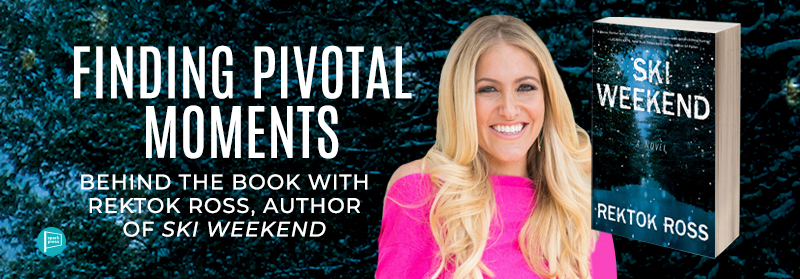
When I sat down to write my young adult survival thriller Ski Weekend almost ten years ago, I was very clear on the type of story I wanted to tell. My author brand as it has been developed throughout the years is a little bit of genre mashup: I’d say I’m half Stephen King and half Danielle Steel—meaning my stories have an equal measure of dark thriller/horror and swoony romance. I’ll be the first to admit these two genres don’t necessarily go hand-in-hand, but I think what really draws me is that in both thriller/horror and romance, the stakes could not be any higher for your characters. In thriller/horror, your characters are literally dealing with a life and death situation. There is absolutely nothing more adrenaline pumping, endorphin inducing, and emotionally impactful than a real live-or-die story. If the wrong decision is made, the characters will face the ultimate consequence—death.
Love stories, while different, still evoke a very similar high-octane emotional response. Especially for teens, the finding of love or the loss of it can often seem as important—and sometimes as painful—as life or death. That’s probably why we have such popular colloquialisms in real-world romance situations, like when we say things such as how we might “die” of a broken heart or that our lives are “over” after a particularly hard breakup.
For my YA thriller Ski Weekend, I knew I wanted to effectively blend these two genres together to tell the story of six teens from all different walks of life, on the way to a high school senior ski trip, who get stranded in the mountains and must survive. To do this properly, I knew it would be key to pinpoint what works well in those particular genres and really study the hallmarks of what makes a pivotal moment within them.
For thriller/horror, I took inspiration from man vs. nature survival horror films like Alive and Aliens. In these stories, one of the most pivotal moments is showing a death that has emotional resonance. In thriller/horror that is done well, you can’t simply kill off your characters; you must do it in a way that leaves the reader feeling like they’ve just been punched in the gut. This often means picking the perfect time to kill the character—right after a moment of particularly high emotional resonance. It is often a running joke in thriller/horror circles that the minute you really get to know and fall in love with a character, they are being set up for a great death scene. You’ll often see this play out in popular horror television shows like The Walking Dead and Squid Games or books like The Hunger Games. This is not by accident. It is to make the reader fall in love with a character so the death is that much sadder and impactful when it happens.
It was important for me while writing Ski Weekend to find those high emotional moments for readers to know and really care about my characters before they die. (No spoilers here but it is a survival thriller so, of course, not everyone lives to the end of the story.) I really wanted to create characters a reader could like and root for—characters I, myself, fell in love with—so the reader could feel shock and even pain when those characters died. The character deaths needed to mean something so that readers would think about their own life and mortality.
With respect to romance, I wanted to evoke the angsty romance and first love butterflies you often see playing out in John Hughes movies like The Breakfast Club and Pretty in Pink. Love stories also have some key pivotal moments and for many, especially teen fiction, there is no moment more impactful than that first kiss. In a frenemies-to-lovers romance like Ski Weekend, you need to really build up the emotions and tension to make that first kiss really matter. It is vital to pick a moment for that first kiss that feels special and earned, so that readers also have an emotional release experiencing it right along with the main character.
However, the special challenge in Ski Weekend was that the main character must have that important first kiss in the middle of her world going to Hell in a handbasket. Since it is a survival story, there are many other things going on that are also equally as important as first love—especially character deaths. I knew that for Ski Weekend to work, I had to pick a pivotal moment for readers to watch this first kiss unfold, but also do so in a way that didn’t take away from the very serious aspects of this survival scenario or trivialize everything else going on. There’s a very delicate balance between having romance in a book like Ski Weekend and writing it in such a way that readers can believe romance is possible even with death happening around them.
In your work, whatever genre you are writing, my best advice is to study that genre carefully in all modes of storytelling—books, film, tv—and see if you can pinpoint what are the most pivotal moments you most often see repeating in that genre and find a way to include those moments in your own work. Your readers will be expecting it and if you can really play it up, you are likely to find it pays off, especially for dedicated, savvy readers of genre fiction.

Leave A Comment